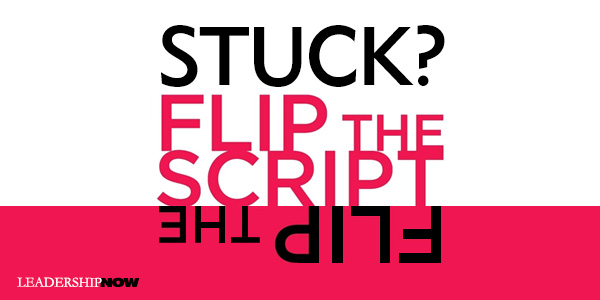 |
 |
05.03.12

Stuck? Flip the Script
THE premise of Flip the Script is approaching everything in your life with a new mindset: you can’t control circumstances but you can manage them. Author Bill Wackermann says that the first step is to “embrace the notion that turning a situation around and creating new opportunities takes the desire to face yourself as you really are and a willingness to see the potential that could be hiding right in front of you.” Wackermann believes that anything can be flipped—any expectation can be turned upside down. It is a skill that can be learned and developed through practice. The book is divided into three sections: understanding yourself, navigating how to build your flip, and winning, overcoming obstacles and putting it all together. All three steps are important, but the first section is the meat of the book and the one that requires the most attention because this is where we get in our own way most of the time. Understanding yourself and your situation requires honesty. It doesn’t do any good to make excuses here; that only clouds the issues. “Designing your way around obstacles starts with a proper mind-set.” Begin by asking, “So what if …?” So what if there isn’t enough money? We are short on people? So what if they don’t come through? “So what if?” is a “mental tactic that allows you to force yourself to consider alternative viewpoints and plan for the worst.” Taking responsibility for where you are in this moment, is crucial and once done can actually provide us with a great deal of freedom. Blaming others imprisons us. Wackermann suggests asking yourself:
In conjunction with those questions, you might also ask yourself:
Wackerman says blame is like candy; too much is unhealthful and will make you sick. “What’s standing between you and success right now is you. Not your folks, not your history, just you. I’m not suggesting that you deny your past, but I am advising that you refuse to live there because it just might kill your future.” He covers common areas of self-sabotage like Know-It-All-Ism, My Boss Hates Me, Taking Things Personally, Perception is Reality, and Excusing Yourself. Wackermann leaves you with much to think about. Here are a few more ideas to keep in mind: Flipping means managing all aspects of a situation, including the internal and external…A successful flip requires that we not confuse our motives with what the world sees. To move our goals forward, we have to be mature enough to recognize that perception, unfortunately, is reality. That is business, and our actions and behavior shape how others see us and see our potential for growth. The good news is that we can control in way both big and small how the world sees us.

Posted by Michael McKinney at 09:41 AM
|
BUILD YOUR KNOWLEDGE
 

How to Do Your Start-Up Right STRAIGHT TALK FOR START-UPS 
Grow Your Leadership Skills NEW AND UPCOMING LEADERSHIP BOOKS 
Leadership Minute BITE-SIZE CONCEPTS YOU CAN CHEW ON 
Classic Leadership Books BOOKS TO READ BEFORE YOU LEAD |